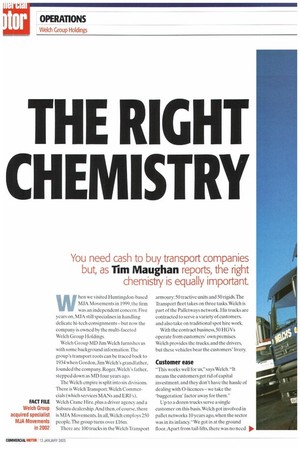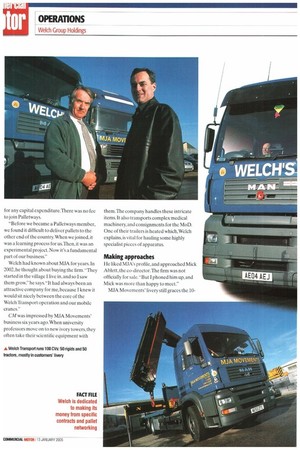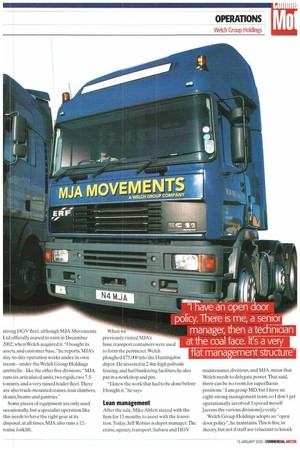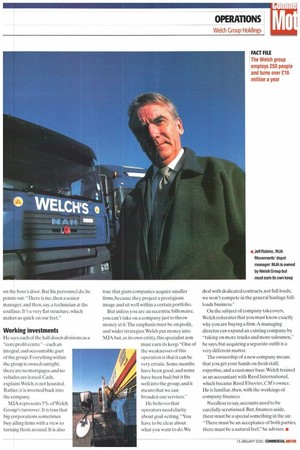THE It CHEM
Page 50

Page 52

Page 53

Page 55

If you've noticed an error in this article please click here to report it so we can fix it.
You need cash to buy transport companies but, as Tim Maughan reports, the right chemistry is equally important.
When we visited Huntingdon-based MJA Movements in 1999, the firm was an independent concern. Five years on. MJA still specialises in handling delicate hi-tech consignments — but now the company is owned by the multi-faceted Welch Group Holdings.
Welch Group MD Jim Welch furnishes us with some background information. The group's transport roots can be traced back to 1934 when Gordon, JimWelch's grandfather, founded the company. Roger,Welch's father, stepped down as MD four years ago.
The Welch empire is split into six divisions. There is Welch Transport, Welch Commercials (which services MANs and ERFs), Welch Crane Hire, plus a driver agency and a Subaru dealership.And then, of course, there is MJA Movements. In all, Welch employs 250 people.The group turns over £16m.
There are 100 trucks in the Welch Transport arrnoury: 50 tractive units and 50 rigids. The Transport fleet takes on three tasks. Welch is part of the Palle tways network. His trucks are contracted to serve a variety of customers, and also take on traditional spot hire work.
With the contract business, 50 HGVs operate from customers' own premises. Welch provides the trucks, and the drivers, but these vehicles bear the customers' livery.
Customer ease
"This works well for us," says Welch. "It means the customers get rid of capital investment, and they don't have the hassle of dealing with 0-licences — we take the lauggeration' factor away for them."
Up to a dozen trucks serve a single customer on this basis. Welch got involved in pallet networks 10 years ago, when the sector was in its infancy. 'We got in at the ground floor.Apart from tail-lifts, there was no need Po for any capital expenditure.There was no fee to join Palletways.
"Before we became a Palletways member, we found it difficult to deliver pallets to the other end of the country When we joined, it was a learning process for us. Then, it was an experimental project. Now it's a fundamental part of our business."
Welch had known about MJA for years. In 2002, he thought about buying the firm. "They started in the village I live in, and so I saw them grow,he says. "It had always been an attractive company for me, because I knew it would sit nicely between the core of the Welch Transport operation and our mobile cranes."
CM was impressed by MJA Movements' business six years ago. When university professors move on to new ivory towers, they often take their scientific equipment with them.The company handles these intricate items. It also transports complex medical machinery, and consignments for the MoD. One of their trailers is heated which, Welch explains, is vital for hauling some highly specialist pieces of apparatus.
Making approaches He liked MJA's profile, and approached Mick Ablett, the co-director.The firm was not officially for sale. -But I phoned him up, and Mick was more than happy to meet."
MJA Movements' livery still graces the 10 strong HGV fleet, although MJA Movements Ltd officially ceased to exist in December 2002, when Welch acquired it." 1 bought its assets, and customer base," he reports. MJA's day-to-day operation works under its own steam — under the Welch Group Holdings umbrella— like the other five divisions."MJA runs six articulated units, two rigids, two 7.5tonners, and a very mixed trailer fleet. There are also truck-mounted cranes, stair climbers, skates, beams and gantries."
Some pieces of equipment are only used occasionally, but a specialist operation like this needs to have the right gear at its disposal, at all times. MJA also runs a 12tonne forklift. When we previously visited MJA's base, transport containers were used to form the perimeter. Welch ploughed £75,000 into the Huntingdon depot. He invested in 2.4m-high palisade fencing, and fuel bunkering facilities; he also put in a workshop and pits.
"1 knew the work that had to be done before I bought it," he says.
Lean management
After the sale, Mike Ablett stayed with the firm for 15 months, to assist with the transition.Today. Jeff Robins is depot manager.The crane, agency, transport. Subaru and HGV maintenance divisions, and MJA, mean that Welch needs to delegate power. That said, there can be no room for superfluous positions. "1 am group MD, but I have an eight-strong management team, so 1. don't get operationally involved. I spread myself [across the various divisions] evenly."
Welch Group Holdings adopts an "open door policy", he maintains.This is fine, in theory, but not if staff are reluctant to knock on the boss's door. But his personnel do, he points out, "There is me, then a senior manager, and then, say, a technician at the coalface. It's a very flat structure, which makes us quick on our feet."
Working investments
He sees each of the half dozen divisions as a "core profit centre—each an integral, and accountable, part of the group. Everything within the group is owned outright; there are no mortgages, and no vehicles are leased. Cash. explains Welch, is not hoarded. Rather, it is invested back into the company.
MIA represents 5% of Welch Group's turnover. It is true that big corporations sometimes buy ailing firms with a view to turning them around. It is also true that giant companies acquire smaller firms, because they project a prestigious image and sit well within a certain portfolio.
But unless you are an eccentric billionaire, you can't take on a company just to throw money at it.The emphasis must be on profit, and wider strategies. Welch put money into MIA but, as its own entity, this specialist arm must earn its keep. "One of the weaknesses of this operation is that it can be very erratic. Some months have been good, and some have been bad; but it fits well into the group, and it means that we can broaden our services."
He believes that operators need clarity about goal-setting. "You have to be clear about what you want to do.We deal with dedicated contracts, not full loads; we won't compete in the general haulage fullloads business."
On the subject of company takeovers, Welch reiterates that you must know exactly why you are buying a firm.A managing director can expand an existing company by "taking on more trucks and more salesmen," he says, but acquiring a separate outfit is a very different matter.
The ownership of a new company means that you get your hands on fresh staff, expertise, and a customer base.Welch trained as an accountant with Reed International, which became Reed Elsevier, CM's owner. He is familiar, then, with the workings of company finances.
Needless to say, accounts need to be carefully scrutinised. But, finances aside, there must he a special something in the air. "There must be an acceptance of both parties, there must be a natural feel," he advises. •






















































































































































































